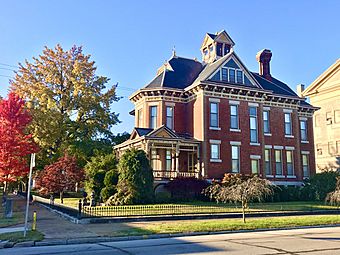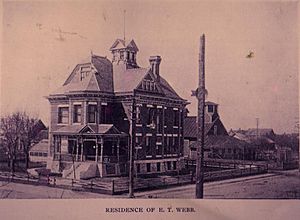Elijah Thomas Webb Residence facts for kids
Quick facts for kids |
|
|
Elijah Thomas Webb Residence
|
|

The house in 2019
|
|
| Location | 4 S. Liberty, Webb City, Missouri |
|---|---|
| Area | Less than one acre |
| Built | c. 1891 |
| Architectural style | Late Victorian Queen Anne |
| NRHP reference No. | 100005346 |
| Added to NRHP | July 20, 2020 |
The Elijah Thomas Webb Residence is a special old house in Webb City, Missouri. It was added to the National Register of Historic Places in 2020. This means it's an important building worth protecting. The house is a great example of the Queen Anne design. It was built around 1891 and still looks much like it did back then. It's one of the few Queen Anne homes left in Webb City.
The house mixes different styles. These include Queen Anne, Italianate, Romanesque, and Eastlake Movement details. It has an unusual shape with a hip roof made of slate. There are also some lower roof sections and a cool tower on the front. The walls are red brick. They have special corner bricks that look like decorative stone blocks. The house sits on a strong limestone foundation. Around 1914, a sleeping porch was added to the second floor.
Contents
Meet Elijah Thomas Webb
Elijah Thomas Webb was born on August 24, 1851. He was the oldest of four children. His family moved from Overton County, Tennessee, to southwest Missouri in 1856. They wanted to start a new life farming. They settled about 6 miles southeast of where Webb City is today.
In February 1857, Elijah's father, John Webb, bought 200 acres of land. He began farming it. During the American Civil War, John Webb left to serve in the army. Elijah, though young, took over as the head of the family. After the war, John came back and bought even more land. He owned 320 acres in total.
The Discovery of Lead
In June 1873, John Webb made a big discovery. He found lead while plowing his corn field. At first, he tried to mine the lead himself. But after about a year, he decided to lease his land for mining. He used the money he earned to buy more land and build new properties.
John Webb officially created the town of Webb City in September 1875. By December 8, 1876, Webb City became an official town. The town grew quickly because of the lead mining. This success attracted major railroads to the area. These included the Missouri Pacific, the Kansas City, Fort Scott and Memphis, and the St. Louis & San Francisco railroads.
Elijah's Education and Business
In 1877, Elijah Webb went to the University of Missouri in Columbia. After that, he studied at Gem City Commercial College in Quincy, Illinois. He then returned to Missouri. For two years, he worked as a deputy county collector in Carthage.
Later, Elijah joined his father's business. On June 2, 1882, they started the Webb City Bank. His father passed away on April 13, 1883. Elijah then inherited the bank. He also received a part of the family's land, which was rich in lead and zinc.
Elijah's Success and His Home
By 1883, Elijah Webb was very busy. He was the treasurer of Webb City. He was also a school board member. He was even a director of the Joplin College of Physicians and Surgeons.
By 1891, Elijah was married and had a son. He was the President of Webb City Bank. He also owned parts of the Webb City Lumber Company and the Webb City Water Works Company. His many businesses and valuable land made him very wealthy. He was worth about $300,000, which was a huge amount of money back then. This wealth allowed him to build his grand Queen Anne home. It was a symbol of his success.
The exact year the house was built is not known for sure. The architect is also a mystery. But Elijah Webb bought the land in 1891. So, the house was likely built soon after that. A map from 1906 shows the house already existed.
The house was listed on the National Register of Historic Places because of its owners. Don and Becky Freeman bought the home around 2010. They did all the research themselves to get the house recognized as a historic place.
 | Frances Mary Albrier |
 | Whitney Young |
 | Muhammad Ali |




